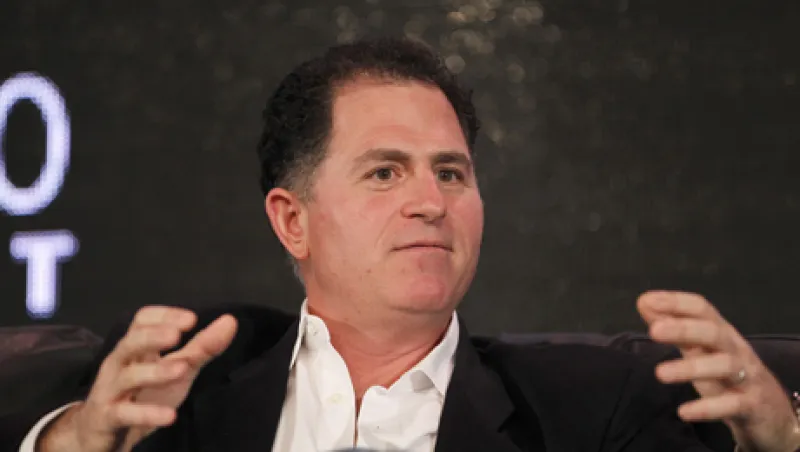This month, after a heated bidding war, Dell acquired Aliso Viejo, California–based Quest Software for $2.4 billion in cash at $28.00 per share. It is the ninth acquisition for the Round Rock, Texas–based personal computing company since the start of 2011. Other companies it recently scooped up include San Jose, California–based manufacturer of thin computers Wyse in May and San Jose–based Ethernet switching manufacturer Force10 in August 2011.
Dell is now looking to build a $5 billion software enterprise over the long term to complement its hardware and cloud computing offerings. The ambitious goal, set out earlier this month by Dell Software head John Swainson, will diversify its PC-reliant revenues — although it still will not be close to Microsoft’s juggernaut of over $17 billion in software sales.
Gartner, a Stamford, Connecticut–based technology research company, estimates that revenues from software-as-a-service, or cloud software, will increase by 18 percent this year. That compares to analyst estimates of about 3 percent for hardware sales. Dell may have difficulty grabbing that growth, however. Its sales have been declining in all segments, government and corporate, except with small-to-medium enterprises.
Dell expects that Quest’s moderate but stable growth at a 9 percent five-year CAGR will provide the foundation that enables it to meet its short-term target. “Our customers need solutions to their IT challenges now,” emphasizes David Frink, a spokesperson for the company.
With $857 million in revenues in 2011, Quest’s strengths reside in its applications, databases, virtualizations and security systems. For example, its performance-monitoring solution Quest Foglight consistently ranks in the top tier by analysts. Data protection programs like NetVault will also be a boon for Dell’s cloud computing services.
Quest got a lucrative payout. Private equity firm Insight Venture initially proposed $23 per share on March 8. But the deal had an unusual six-month “go-shop” period, much longer than the typical 30 days, in which Quest Software could look for another bidder. It generated multiple offers. The final $28 per share topping bid by Dell was a 22 percent premium to the initial deal and nearly the highest price Quest Software has traded in ten years. That’s unusually competitive in a go-shop process, according to banking sources.
But Brian Feed of Wunderlich Securities notes that the initial bid was in the bottom 10 percent of takeout multiples in the “comp universe” and “was designed from the start to drive an auction process.”
It’s less clear whether the deal was right for Dell. After the announcement on July 2, Dell’s stock price dropped from $12.51 on June 29 to $12.39 and has fallen further since to $12.03 on July 27. Billionaire Leon Cooperman, CEO of Omega Advisors, would not buy Dell stock for the same reasons highly regarded short-seller Jim Chanos is negative about HP, he told Institutional Investor at this year’s Delivering Alpha conference on July 18.
Chanos of hedge fund Kynikos Associates argues that HP is “the ultimate value trap,” in which investors buy a stock thinking it’s priced too low, only to find out the price does not increase over time. David Einhorn of Greenlight Capital sold about $200 million in Dell stock during this past quarter.
But Avi Silver, a technology analyst for CLSA, an affiliate of Crédit Agricole Securities, has a brighter view of the company. He and his colleague Chang Liu have an outperform rating on Dell’s stock. “We believe Dell’s M&A strategy has been highly effective; the breadth of the management team is strengthening through M&A and strategic hires; its sales execution issues should be fixed in the next few quarters; and shareholder returns are favorable with the introduction of a $0.32 dividend,” they wrote in a June 14 research note, “Enterprise Shift Underway.”
Even if Quest turns out to be favorable for Dell, Theodore Koenig, CEO of Monroe Capital, does not think Dell will easily find another strong software candidate in the near future. Quest Software is an example of “the few instances where these companies are very, very desirable as a merger candidate,” he says.
The challenging environment has lead private equity firms to scale back activity this year. According to Dealogic, financial sponsors buyouts in the tech space have shrunk to $6.1 billion year-to-July 27 from $22.5 billion in 2011. For Dell, it means less competition for what’s left, though its unclear whether acquisitions will be a faster route to software success than organic growth.






